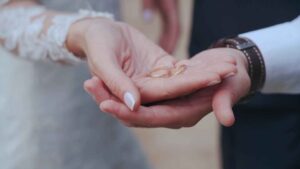FAUNA
Απρ 20, 2025 Κινηματογράφος 0
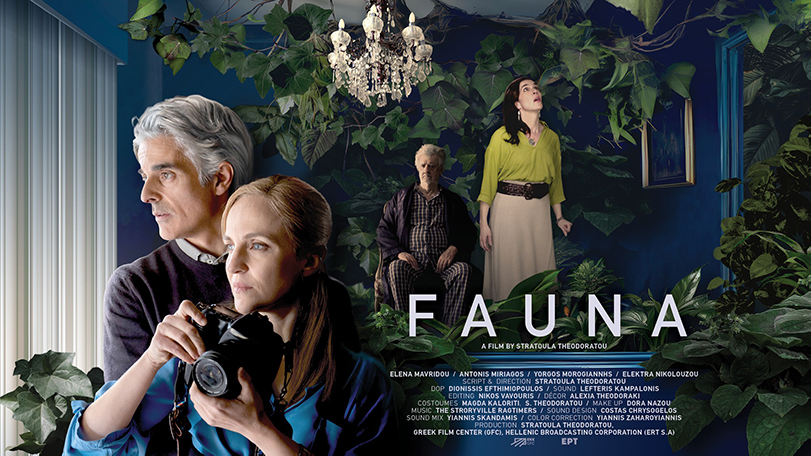
MOVIE REVIEW
STRANGE ECOSYSTEM
Fauna: by Giannis Fragoulis
Stratoula Theodoratou’s film, «Fauna», is a work that deserves to be watched, to be studied carefully in order to understand its structures. I saw it at the Thessaloniki Film Festival, I saw it again to «refresh» it in my memory. The same feelings it brought both times. The remarkable thing is that the first shots, when I saw it for the second time, brought the film in its entirety to my mind. So the film was well and truly «nested» in my unconscious mind. And that says a lot about the film.
Fauna: The movie
Four people are accidentally found together. A conflict begins that brings up old traumas. Life, love, politics, and social turmoil are all elements that spring up and create a peculiar ecosystem. The occasion is a demonstration, the trouble with security guards and riot police, the demonstrators are the «backdrop» to structure this system that we can call «Greek society». But, let’s take things in order. Let’s say, however, that a film like this is a challenge for a film critic: confronted with both the value elements of the film and those in his unconscious, he has to put everything in order to make his critical note. This is not an easy task!
The film begins with a demonstration. A photographer appears and «covers» this demonstration photographically. Although she has, hanging on her arm, a tear gas protection mask, she works unprotected, enters the demonstration, clashes with riot police and with the people or security guards. Until she encounters an old man eating out of the garbage. His identification to the police and contact with his family follow. That’s where the movie begins. Or so we think at first glance. But is that the way things are?
Fauna: The narrative elements
There are narrative elements in the film that, at first, are arranged in a «logical» order. Then that logic is lost. What disrupts the narrative function is the intervention of nature, the wind rushing through the apartment, and the trouble, at several points, is within the narrative field with its violence. It’s a common motif in cinema. Instead of there being a narrative subversion, we have something extra-narrative that upsets the internal narrative world, as in «Les vacances de Monsieur Hulot» for example.
These extra-narrative twists introduce the turbulence in the narrative that will come next. The photographer, the elderly man’s son, his wife and his father are persons who had some relationship to each other. Relationships, seemingly, unconnected, but essentially intertwined enough to produce their meaning. I won’t give away the plot of the film to leave the surprise to the viewers. I will, however, try to get to the core of the film’s narrative.
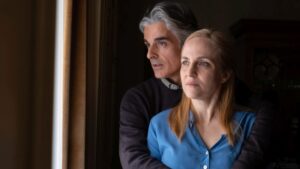
Fauna: The director
With «Short, narrow and black» (1996), a short film, we met Stratoula Thoedoratou at the Drama Festival. 10 films followed, including this one, including 3 shorts, to reach «Fauna». The production of short films, among the feature films, shows that their creator is searching, as far as the cinematic form is concerned. And so it is. What we see again in Stratoula Theodoratou’s work is that she investigates, focuses and her gaze nests in the psychic world of man, structuring, in this way, her own narrative world.
In « Fauna» this is evident. The camera is the eye of a researcher. We could say that it is a subjective shot of an ideological quest. The characters embody, very successfully, the persons who, as the film progresses, create their own ecosystem. Here we understand that the term «fauna» has a dual meaning: ecological, referring to ecological destruction, and social, speaking of social decay. I got them mixed up again!
Fauna: The relationships
In biology, a destruction of an ecosystem can be the beginning of a new biological chain. Life re-creates its own sequences and makes a new ecosystem, a new fauna. In society, almost the same thing happens. If in nature we speak of living beings, in society we refer to people and what surrounds them, as ecology defines the environment. Among other things, this process is the basic view, first of the ancient materialist philosophers and then of Hegel and Marx. This dialectic is evident in this film. It is structured from the editing, which is structured to follow his eisensteinian vision, to the ideological editing.
The relationships of these four people unfold in a simple and constructive way. Our focal points take us from one realm to another. At the beginning, in the narrative world of the film, there is a relative anarchy. This may surprise us. The answer to the question – «What does it say now?» – comes on its own. Quickly the narrative leads us into narrative landscapes that show us parts of society that are more or less familiar to us. The viewer begins to identify with and, progressively, becomes a reader of the filmic text, becomes involved in it, makes up his or her own narrative.
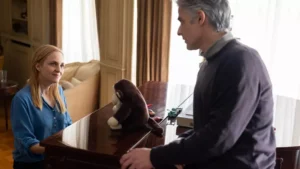
Fauna: The rhythm
The twists and turns are necessary for there to be a rhythm to the cinematic narrative. The director knows this very well and applies it. The attraction -and erotic attraction- of two of the protagonists gives way to repulsion. This is present throughout the film, almost to the end. But this «come and go» unfolds a morally infectious landscape in this «family». This is a miniature of Greek society, at least as far as its recent history is concerned, which we know somewhat better. Scandals, conflicts, environmental destruction, murder, business, love affairs are the driving force behind the evolution of Greek society. These conflicts are the mother of the development of a society that does not serve man at all, to paraphrase Heraclitus a little.
In the end it’s all clear. Only one doubt remains: Which of all this, in the film’s narrative, was reality and which was fantasy? Were the photographer and the man in a relationship, married or not? Did his father die, and how? What mysterious force «arranged» their lives? Do they love or hate each other? These are the basic questions. The film leaves them unanswered. This is great because it gives the viewer the baton to create their own narrative. This is how the film works perfectly. I am your image, society and I look like you, it’s as if the director is saying. And so it is!
Fauna: The actors
Elena Mavridou is excellent as a woman who is not loveable at first sight, you gradually fall in love with her as you see her passion for the truth to shine, for her vision of a more humane society, she embodies this character amazingly. George Morogiannis, as the father, plays the man who has problems with his memory, with a flawed past, as much to connect the characters, to structure the narrative, moving along a completely realistic narrative line, the violence terrifies him, as if bringing something from the past into his deconstructed memory. Elektra Nikolouzou is the wife who perfectly realistically portrays the modern manager, the deceived (?) wife, the devoted pawn in an inhuman society, without caring about it.
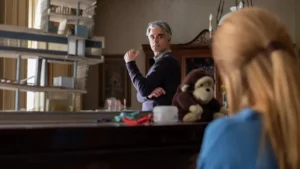
Antonis Miriagos embodies the husband who lives in a corrupt system, accepts it, is indifferent, likes the photographer and, at the same time, despises her. He is attracted by her past – and theirs – and, at the same time, he hates it. He is distanced from his father, he is alienated as if he hates and repels this microcosm in which he lives. These two characters make for a perfectly realistic world and at the same time fantastic. They play so well that you can’t tell which is realistic and which is fantasy. The answer is in the hands of the viewer who will have to continue the development of the narrative. In this way the film is alive after the screening is over. And for a long time in the viewer’s unconscious, creating other narrative worlds, then when elements of reality abandon those in the reservoir of the unconscious, according to Jung.
«Fauna» is a film critic’s delight. He has his own creation to write about, to enjoy. To contend with the narrative elements of the film. To discover its hidden secrets. To structure his own narrative. Finally, to commune with its message. Once the film is over, he feels the need to write about it.
FAUNA
Directed by Stratoula Theodoratou
Script: Stratoula Theodoratou
Photography: Dionysis Efthimiopoulos
Editing: Nikos Vavouris
Music: The Stroryville Ragtimers
Sound: Alexia Theodoraki
Costumes: Magda Kalloritis, Stratoula Theodoratou
Producers: Stratoula Theodoratou
Actors: Elena Mavridou (photographer, Anna), Antonis Miriagos (husband, architect, Pavlos), George Morogiannis (father, Lambros), Elektra Nikolouzou (architect’s wife, Doretta)
Country of production: Greece
Year of production: 2024
Language: greek
Colour: colour
Duration: 110΄
Distribution company: Stratoula Theodoratou
For more information on the casting and technical characteristics see here..
Read the movie reviews we have published
Σχετικά άρθρα
-
 THE RETURN OF IVAN
THE RETURN OF IVANΑπρ 15, 2025 0
-

-
 EN FANFARE
EN FANFAREΑπρ 12, 2025 0
-
 RETURN TO HOMELAND
RETURN TO HOMELANDΑπρ 09, 2025 0
Στην ίδια κατηγορία
-
 01 ΝΑΝΟΣ ΒΑΛΑΩΡΙΤΗΣ...
01 ΝΑΝΟΣ ΒΑΛΑΩΡΙΤΗΣ...Απρ 18, 2025 0
-

-
 ΤΟ VIDEO CHANNEL
ΤΟ VIDEO CHANNELΑπρ 15, 2025 0
-

Αναζήτηση
-
 WONDER WOMAN
WONDER WOMANΙούν 09, 2017 138
-
 ΠΑΙΔΙΚΗ ΣΚΗΝΗ
ΠΑΙΔΙΚΗ ΣΚΗΝΗΟκτ 12, 2014 2
-
 ΚΛΗΡΩΣΗ ΠΡΟΣΚΛΗΣΕΩΝ
ΚΛΗΡΩΣΗ ΠΡΟΣΚΛΗΣΕΩΝΜαρ 22, 2014 2
-
 ΔΥΟ ΜΕΡΕΣ, ΜΙΑ ΝΥΧΤΑ
ΔΥΟ ΜΕΡΕΣ, ΜΙΑ ΝΥΧΤΑΝοέ 13, 2014 2
-
 ΑΧΙΛΛΕΑΣ ΨΑΛΤΟΠΟΥΛΟΣ
ΑΧΙΛΛΕΑΣ ΨΑΛΤΟΠΟΥΛΟΣΝοέ 09, 2014 2
-
 ISTABUL FILM FESTIVAL
ISTABUL FILM FESTIVALΜαρ 08, 2014 2
-

-
 01 ΝΑΝΟΣ ΒΑΛΑΩΡΙΤΗΣ MARIA WILSON
01 ΝΑΝΟΣ ΒΑΛΑΩΡΙΤΗΣ MARIA WILSONΑπρ 18, 2025 0
-

-
 ΤΟ VIDEO CHANNEL
ΤΟ VIDEO CHANNELΑπρ 15, 2025 0
-

-
 THE RETURN OF IVAN
THE RETURN OF IVANΑπρ 15, 2025 0
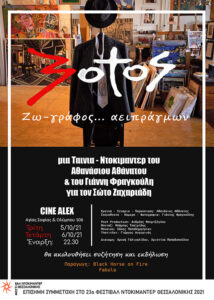
Δείτε το τρέιλερ της ταινίας μας, που συμμετέχει το Φεστιβάλ Ντοκιμαντέρ Θεσσαλονίκης.
SOTOS, EVERLASTING PAINTER (TRAILER)
Youtube
Επικοινωνήστε
ΓΙΑΝΝΗΣ ΦΡΑΓΚΟΥΛΗΣ
Email: info@filmandtheater.gr
Τηλ: (+30) 6974123481
Διεύθυνση: Ιωαννίνων 2, 56430, Σταυρούπολη Θεσσαλονίκη
![]()

